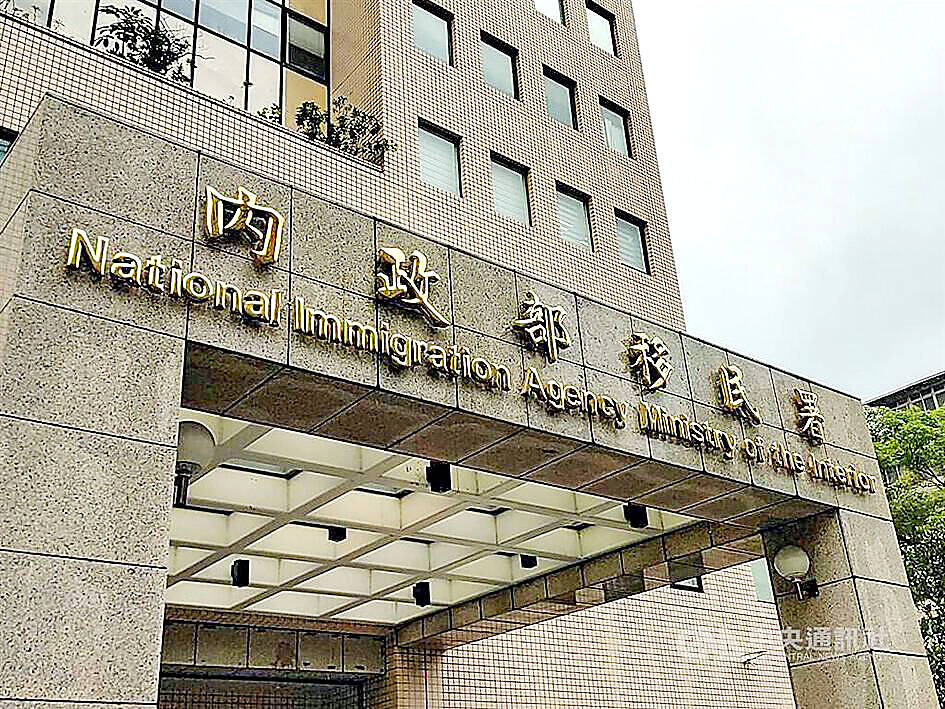A total of 1,668 Chinese immigrants have not submitted proof of renouncing their Chinese household registration by the deadline, the National Immigration Agency (NIA) said, with a source saying yesterday that their status could be turned from “registered permanent resident (定居)” to “resident (居留)” if they are later found to still be registered in China.
The agency had notified Chinese immigrants who reside in Taiwan to submit proof that they had given up their household registration in China before Monday last week, but it could not contact 1,668 of them.
A government official familiar with national security issues said that most of the missing immigrants are living abroad, including many “nationals without household registration” who have not returned to Taiwan for two years, or they could also be in China.

Photo: CNA
If the immigrants are in Taiwan or if most of their family members are in Taiwan, or work in Taiwan, and they want to stay in Taiwan, but are forced to give up their citizenship, then their “registered permanent resident” status would be revoked and they would be given only “resident” status, they said.
Regarding possible national security issues of having household registration in both Taiwan and China, the official said there would be national security risks if people are confused about their nationality, and there would be trouble for the personnel on both sides, as they cannot tell whether someone is Chinese or Taiwanese.
The Mainland Affairs Council has found that many Chinese nationals with registered permanent residence in Taiwan have dual nationality, which is a problem, they said.
Under China’s integrated development policy, it wants to confuse Taiwanese identity, just as Russia began granting citizenship to some Ukrainians before its invasion in 2022, particularly in Crimea and eastern Ukraine, the source said.
While China has already granted residence permits to many Taiwanese, the Taiwan Affairs Office in China’s Fujian Province has allowed many Taiwanese to have dual citizenship, they said.
The office allows Taiwanese to easily apply for a permanent residence permit or an identity card, without needing to submit their Taiwan identity documents, they said, adding that it is aimed to confuse Taiwanese national identity in preparation for unification.
From a personal perspective, people with dual citizenship — having household registration in both Taiwan and China, and receiving a pension and welfare payments from both sides — is also unfair, they said.
It breaches the Act Governing Relations Between the People of the Taiwan Area and the Mainland Area (臺灣地區與大陸地區人民關係條例), which stipulates that Taiwanese cannot have household registration in China or a Chinese passport, the source said.
Wang Chih-sheng (王智盛), an associate professor at the Central Police University’s Border Police Department, said Chinese nationals or Chinese immigrants married to Taiwanese who have dual citizenship might have confused national identity and allegiance problems when they run to become a public representative.
The Chinese Communist Party could use them to spread confusion about national identity in Taiwan, he said, adding that some Chinese immigrants might be asked to carry out political tasks, or some Chinese spouses asked not to submit their proof of their renounced Chinese citizenship to test the limits of Taiwan’s government.
In practice, dual nationality also has legal issues, such as that Chinese spouses can only receive up to NT$2 million (US$68,852) in inheritance according to the law, and only Taiwanese can inherit property according to the Civil Code, Wang said.
A person’s rights and obligations are linked to their national identity, so only allowing Chinese spouses to have one national identity is necessary to protect their rights, he said.

FIREPOWER: On top of the torpedoes, the military would procure Kestrel II anti-tank weapons systems to replace aging license-produced M72 LAW launchers Taiwan is to receive US-made Mark 48 torpedoes and training simulators over the next three years, following delays that hampered the navy’s operational readiness, the Ministry of National Defense’s latest budget proposal showed. The navy next year would acquire four training simulator systems for the torpedoes and take receipt of 14 torpedoes in 2027 and 10 torpedoes in 2028, the ministry said in its budget for the next fiscal year. The torpedoes would almost certainly be utilized in the navy’s two upgraded Chien Lung-class submarines and the indigenously developed Hai Kun, should the attack sub successfully reach operational status. US President Donald Trump

Taiwan Semiconductor Manufacturing Co (TSMC, 台積電) is expected to start construction of its 1.4-nanometer chip manufacturing facilities at the Central Taiwan Science Park (CTSP, 中部科學園區) as early as October, the Chinese-language Liberty Times (the Taipei Times’ sister newspaper) reported yesterday, citing the park administration. TSMC acquired land for the second phase of the park’s expansion in Taichung in June. Large cement, construction and facility engineering companies in central Taiwan have reportedly been receiving bids for TSMC-related projects, the report said. Supply-chain firms estimated that the business opportunities for engineering, equipment and materials supply, and back-end packaging and testing could reach as high as

ALL QUIET: The Philippine foreign secretary told senators she would not respond to questions about whether Lin Chia-lung was in the country The Ministry of Foreign Affairs on Wednesday confirmed that a business delegation is visiting the Philippines, but declined to say whether Minister of Foreign Affairs Lin Chia-lung (林佳龍) is part of the group, as Philippine lawmakers raised questions over Lin’s reported visit. The group is being led by Deputy Minister of Agriculture Huang Chao-chin (黃昭欽), Chinese International Economic Cooperation Association (CIECA) chairman Joseph Lyu (呂桔誠) and US-Taiwan Business Council (USTBC) vice president Lotta Danielsson, the ministry said in a statement. However, sources speaking on condition of anonymity said that Lin is leading the delegation of 70 people. Filinvest New Clark City Innovation Park

DEFENSIVE EDGE: The liaison officer would work with Taiwan on drones and military applications for other civilian-developed technologies, a source said A Pentagon unit tasked with facilitating the US military’s adoption of new technology is soon to deploy officials to dozens of friendly nations, including Taiwan, the Financial Times reported yesterday. The US Department of Defense’s Defense Innovation Unit (DIU) is to send a representative to collaborate with Taiwan on drones and military applications from the semiconductor industry by the end of the year, the British daily reported, citing three sources familiar with the matter. “Drones will certainly be a focus, but they will also be looking at connecting to the broader civilian and dual-use ecosystem, including the tech sector,” one source was